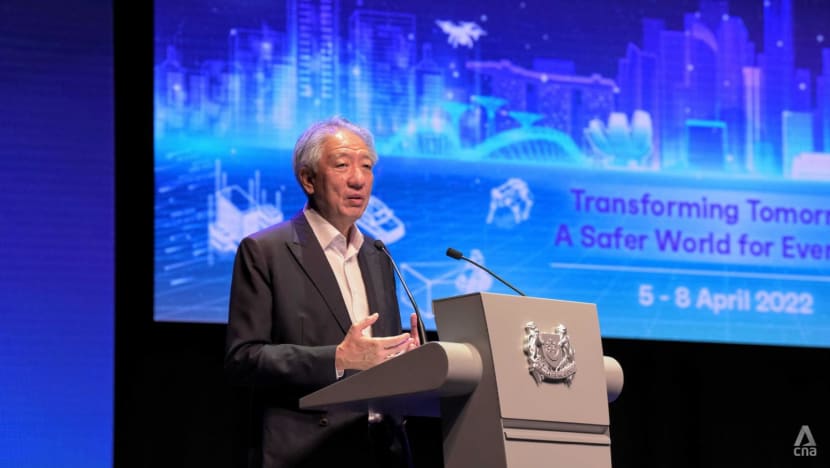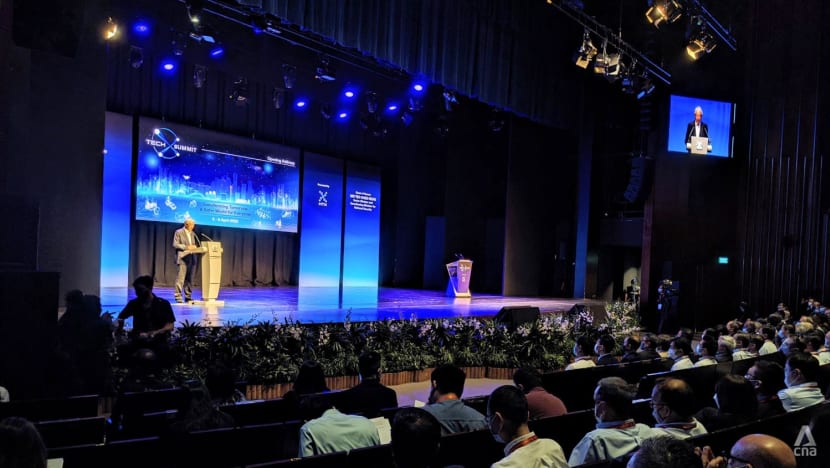Surveillance cameras can keep us safer but raise privacy concerns: Teo Chee Hean

Senior Minister and Coordinating Minister for National Security Teo Chee Hean gives a speech at the opening of the HTX TechX Summit, on Apr 5, 2022. (Photo: Try Sutrisno Foo)
SINGAPORE: While the use of surveillance cameras and facial recognition technology can keep countries safer, they also raise privacy concerns, Senior Minister Teo Chee Hean said on Tuesday (Apr 5).
“We need to establish proper guidelines and standards on the use of technology to provide ample protection, and to preserve trust and confidence,” he said, stressing that technology is not an “unalloyed good”.
“Only with these in place can we make the best use of what technology can offer us, to improve our capability to protect our societies and people from the new dangers.”
Mr Teo, who is also Coordinating Minister for National Security, was speaking at an inaugural tech summit organised by the Home Team Science and Technology Agency (HTX).
The TechX summit, held at the Mediacorp campus, showcases the latest technological innovations in fighting crime.

“In Singapore, our islandwide network of police cameras, or Polcam, enables our police to sense-make and respond faster to incidents happening in real time, thereby deterring crime and significantly reducing the time taken to solve crime,” Mr Teo said.
Facial recognition technology and algorithms that enable real-time image and video processing have also “greatly helped” in sieving through closed-circuit television camera footage, he added.
The police will expand its camera network to more than 200,000 cameras by 2030, at more public spaces and heartland areas.
Artificial intelligence is applied to help officers analyse the high volume of footage, which is stored securely and only accessed by authorised officers.
To date, police cameras have helped the police solve more than 6,000 cases, Mr Teo said.
But the minister called technology a “double-edged sword” that has helped Singapore deal with various threats – ranging from international terrorism to online scams – and enabled new crimes in the cyber world.
“Just as technology can help homeland security and law enforcement agencies, it can also be exploited by offenders, criminals and criminal organisations,” he said.
To counter this, Mr Teo said Singapore’s agencies need new approaches to combat both physical and cybercrime.
Domestically, Singapore’s policies, doctrines, laws and techniques need to be “alive to” and aligned with the new dangers, he said.
The world, he said, also needs new global rules, norms, governance principles, frameworks and standards, given the borderless nature of cybercrime.
“These will ensure that we are all aligned at the policy level to deal with these new threats,” he added.
On this front, Mr Teo urged for more international cooperation, highlighting the TechX summit as a good example to share experiences and best practices.
“More importantly, we need international cooperation to combat transnational and cybercrime, given their growing prevalence,” he said.
“These crimes exploit the gaps and interstices in our defences at the borders, where different legal regimes and jurisdictions meet.”
Mr Teo said Singapore is playing its part at Interpol by hosting the international police force’s Global Complex for Innovation, which has coordinated several large-scale, successful operations against international cybercrime syndicates.
He added that last year, Singapore police worked closely with Interpol and other law enforcement agencies in an operation to crack down on online financial crime.
The operation led to 585 arrests and US$83 million intercepted in an Asia-Pacific probe over six months, Mr Teo said.
“Homeland security agencies all around the world need new approaches, capabilities and greater cooperation in order to better leverage technology, not just to tackle the threats of today, but also to be ready to anticipate and deal with the challenges of tomorrow,” he added.
“Without that, we will be one step behind those who aim to do us harm, and just trying to catch up, rather than staying ahead.”
















